The Last Novel
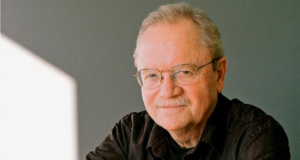 In February, 2014, the doctors told Kent Haruf, the author of the bestselling Plainsong series, that he had interstitial lung cancer. They said it was incurable and he would die soon. It hit him hard, as you’d expect, and for a while, he couldn’t find his way forward, but by April, he was tired of waiting around to die. He needed something to do. He’d been a writer all his life, so he tried to write. He struggled with a few short stories, but they didn’t seem to come together. Then it hit him. He told his wife, Cathy, “I’m going to write our story.” Somehow in the short time he had left, under the dark shadow of the grim reaper’s scythe, he managed to write a masterpiece, his last novel.
In February, 2014, the doctors told Kent Haruf, the author of the bestselling Plainsong series, that he had interstitial lung cancer. They said it was incurable and he would die soon. It hit him hard, as you’d expect, and for a while, he couldn’t find his way forward, but by April, he was tired of waiting around to die. He needed something to do. He’d been a writer all his life, so he tried to write. He struggled with a few short stories, but they didn’t seem to come together. Then it hit him. He told his wife, Cathy, “I’m going to write our story.” Somehow in the short time he had left, under the dark shadow of the grim reaper’s scythe, he managed to write a masterpiece, his last novel.
Our Souls at Night is a love story. Addie and Louis are in their seventies. Both have been recently widowed. They barely know each other, but one day out of the blue, Addie comes knocking at Louis’s door and makes a proposition. She asks him to come to her house at bed time to sleep with her. This isn’t about sex, she explains. She wants him to lie beside her in bed and talk with her before they go to sleep. That’s it. Nothing more.
Louis is startled. He finds her proposal bold and strange, but after he thinks about it, he realizes he’s lonely and hasn’t got much else to do anyway, so he figures, “What the hell?”
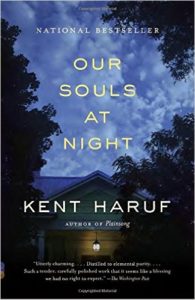
That night, he packs a little bag with his pajamas, toothbrush, and shaving kit. He walks down the street to her house after dark and returns home early the next morning so the neighbors won’t notice and be scandalized. He returns the next night. And the next. While Addie and Louis lay side by side in their bed clothes night after night, they tell each other about their lives, the good times and the bad, and a beautiful love story, magical and wondrous, spins out from there.
Our Souls at Night was inspired by Haruf’s relationship with his wife, Cathy. They knew each other in high school, but they’d never dated. After high school, they went in different directions, and their lives marched on apart from one another. They got married; they raised kids; and their marriages ended in divorce. Not having thought about one another for decades, they attended their thirtieth high school class reunion. They struck up a conversation and discovered they had reached similar places in their lives. In the months that followed, they fell in love and got married, a “late-life gift,” Haruf called it.
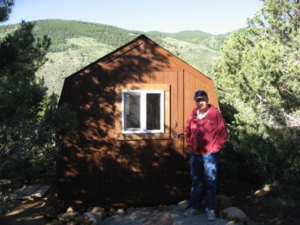 He started to write their love story on May 1, 2014. He retired each morning to the prefabricated shed behind his house where he always did his writing, only this time he was tethered to an oxygen tank. Throughout his career and in this case, he used what has to be the most unusual writing method ever employed. He put on a wool stocking cap, pulled it down over his eyes, and tapped out his first drafts blind on an old Royal upright typewriter. He did this to shut out the real world so he could dream his way into the landscape and community of Holt, Colorado, the fictional high-plains small town where his stories take place. After he completed a chapter typing blind, he took off the cap, reviewed the raw text with all its typos and mistakes, made notes of changes in the margins, and then typed a clean revision.
He started to write their love story on May 1, 2014. He retired each morning to the prefabricated shed behind his house where he always did his writing, only this time he was tethered to an oxygen tank. Throughout his career and in this case, he used what has to be the most unusual writing method ever employed. He put on a wool stocking cap, pulled it down over his eyes, and tapped out his first drafts blind on an old Royal upright typewriter. He did this to shut out the real world so he could dream his way into the landscape and community of Holt, Colorado, the fictional high-plains small town where his stories take place. After he completed a chapter typing blind, he took off the cap, reviewed the raw text with all its typos and mistakes, made notes of changes in the margins, and then typed a clean revision.
On average, it had taken him six years to write one of his previous novels, but this time his deadline was closing fast and unforgiving, so in writing this last novel, he set a goal of finishing a chapter a day. And miraculously, he did it. In forty-five days he wrote forty-five chapters, and then began to revise and polish them.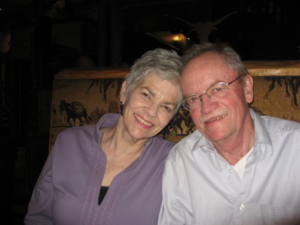
In mid-August when Cathy began transcribing his drafts onto her computer, she must have sensed that this novel was something special. “Don’t you dare die before you finish it,” she told him.
In September, Haruf sent a complete manuscript to his editor, Gary Fisketjon, with a cover note: “Dear Gary, Here’s a little surprise. Love, Kent.” Given Haruf’s condition, Fisketjon was indeed greatly surprised.
He pushed everything else on his desk aside because he knew there couldn’t be much time left for the back-and-forth of editing. Fisketjon and Haruf worked hard on it for the next several weeks. In mid-November, Haruf’s strength waned. He told Cathy she would have to do the final copyedit.
Like Addie and Louis, Cathy and Kent liked to end the day talking to each other in bed. The night of November 29, they went to bed and talked into the night. In the morning, he was gone.
Cathy finished the copyedit two days later.
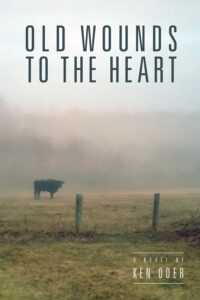 Our Souls at Night was published in May, 2015. I spent most of 2013 and 2014 writing Old Wounds to the Heart. I wanted to write a love story about people in their seventies and eighties. Before I started writing, I searched for similar stories. I found nothing inspiring, and it bothered me. The unstated assumption seemed to be that the elderly aren’t capable of, or for reasons of propriety shouldn’t indulge in, love and passion. I didn’t like that, so I set out to write a story about old people who are vital and alive in every way.
Our Souls at Night was published in May, 2015. I spent most of 2013 and 2014 writing Old Wounds to the Heart. I wanted to write a love story about people in their seventies and eighties. Before I started writing, I searched for similar stories. I found nothing inspiring, and it bothered me. The unstated assumption seemed to be that the elderly aren’t capable of, or for reasons of propriety shouldn’t indulge in, love and passion. I didn’t like that, so I set out to write a story about old people who are vital and alive in every way.
Old Wounds to the Heart is about a love triangle among people in their late seventies. When the story opens, two of them are suicidal and the other is isolated and depressed. An ancient secret of betrayal comes out and their lives clash together in a storm of emotions – rage, jealousy, hate, love, lust, passion, and hope. One day they’re standing around, waiting to die. The next, they’re waging a pitched battle for every breath of life left in them.
I published Old Wounds to the Heart in July, 2015. I found Our Souls at Night a month later. The Fates were kind to me in the timing. I’m not sure I would have written my story if I’d seen Haruf’s last novel beforehand. It says so much of what I wanted to say, but with so much more grace and elegance.
Although written by a writer on death’s doorstep, Our Souls at Night is a celebration of life, and the story behind its creation mirrors its theme. Faced with the certainty of a swiftly approaching death, Haruf did what he loved to do to the very end, ceding every inch of ground to mortality only grudgingly and on his own terms. What a way to go out, and what a great gift to leave behind.



March 10, 2017 @ 10:51 am
Wow Ken,
I am behind on things and only just now catching up on some of your Blogs, this hits really close to home for me and I loved it. Really well done. Sorry for not being able to find better words but.…. It was wonderful.
March 12, 2017 @ 2:18 pm
Thanks, Eric! Your words are just fine and much appreciated.
February 17, 2017 @ 12:09 pm
BEAUTIFUL. And, so is Old Wounds. Now I want to read Our Souls at Night. Loved this heartfelt post, Ken.
February 19, 2017 @ 12:19 pm
Thanks, Pamela!